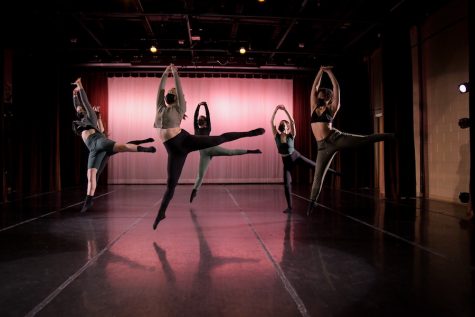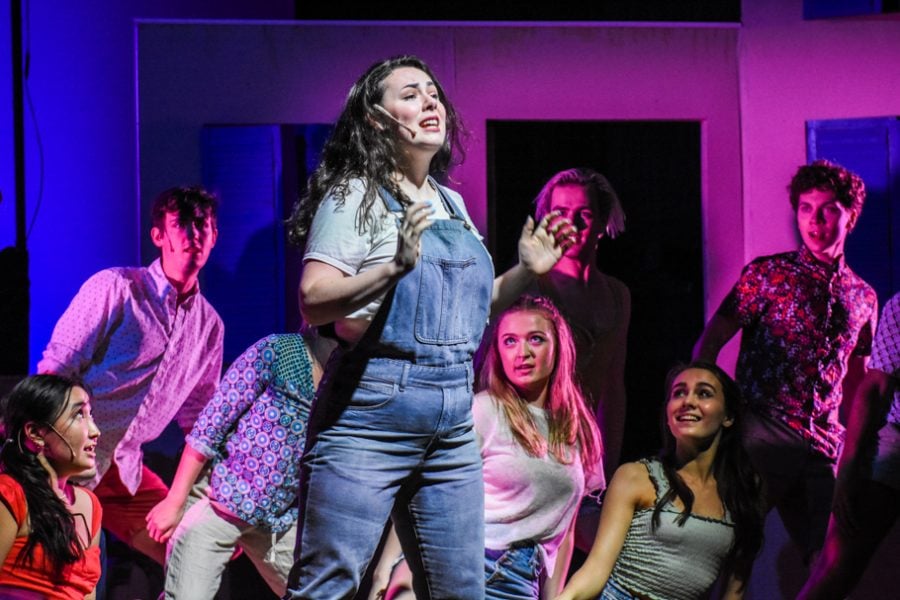After COVID-19 shutdown, performance groups look to emphasize mental health over perfection
Daily file photo by Isabelle Butera
Samara Malik directed “Mamma Mia!” this past fall. She made sure to take into account the mental wellbeing of her cast and crew.
April 4, 2022
Communication senior Samara Malik’s freshman winter was anything but stress-free. With five classes and as much theatre as she could handle, she said her work-life balance was unsustainable.
“I was miserable,” Malik said. “It was to the point where I think that if that had continued, I wouldn’t have made it to my fourth year.”
Then the pandemic began, and classes, rehearsals and performances were moved online. Malik said that break forced her to learn the importance of not overextending herself and how important mental health is to creating great theatre. Many theatre groups have since reimagined how to integrate good mental health practices into performance life.
Communication sophomore Jason Sekili joined a cappella group Extreme Measures his freshman winter. He said it was difficult to stay motivated to rehearse when the group was singing over Zoom. In lieu of its typical in-person performances, Extreme Measures put together videos, featuring each individual recording their piece, which were then mixed together.
Now the program’s president, Sekili said this year the group has taken advantage of in-person practices and performances, emphasizing community over perfect performance.
“I’ve definitely seen a huge change looking at our rehearsals and our performances this year, just being in person, being able to sing together,” Sekili said. “There’s a huge difference between everyone singing muted on Zoom on their laptop compared to getting to sing in a circle and really listen to everyone.”
Extreme Measures recently updated its attendance policy to allow space for members to take time for their mental health, Sekili said. Even so, he said he has seen an uptick in how many people attend rehearsal, which he attributed to the group’s sense of community.

Weinberg junior Maddie Banich joined Graffiti Dancers just before the pandemic started. Since the start of the pandemic, she said her “social battery” has had less capacity than it did when she was a freshman, so dancing six days a week was no longer as effortless as it once was.
“Regardless of whether or not they’re in the dance community, people are much more open about asking for mental health days or just asking for time away,” Banich said. “It’s an interesting balance because I want to be dancing in-person a lot because I missed it so much, but I also care a lot more about balancing my life.”
Banich, who now leads the group as artistic director, said she’s noticed a similar trend within the rest of her group, as attendance is not at pre-pandemic levels. The executive team is trying to reimagine its attendance policy, she said, implementing measures like allowing members to skip one or two practices no-questions-asked each quarter. Leaders also plan to host more social events that will encourage the sense of community that initially made Banich so committed to Graffiti.
As a woman of color, Malik said she’s often felt like she has to do more work than her white peers to be recognized at the same level. During last year’s festival, “Visions and Voices, A Black Playwrights’ Reading Series,” Malik said students of color felt like they had to run “double duty,” working on the festival in addition to their other productions.
She said she hopes Northwestern theatre can do a better job at ensuring POC voices are heard, while also considering how its methods for doing so can have a positive impact on mental health.
Malik is directing her senior thesis, “The Haunting of Hill House,” which is set to premiere this week. Through her directing, she said she hopes to impart the importance of not taking on more than you can handle, even if that means missing out on a show or two.
“In the pandemic, I think it was a lot of just creating art for art’s sake and there’s a lot less pressure on (needing) to make this perfect thing,” Malik said. “It was more like, we just want to make something that feels worthwhile. Post-pandemic, it’s been a lot of passion projects and saying ‘Yes’ to the silly ideas.”
Email: [email protected]
Twitter: @AudreyHettleman
Related Stories:
— Captured: Graffiti Dancers and TONIK Tappers groove in Wirtz for Graffoniks
— As University lifts mask mandate, dance and a capella groups adjust their masking policies
— Artists adapt to increased free time and new struggles amid pandemic












